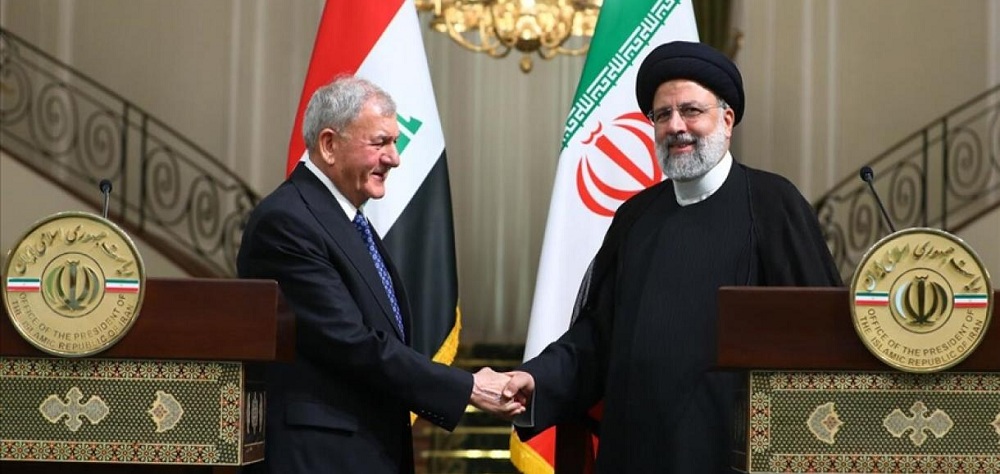Alwaght- Despite the American obstructions ahead of the Iranian-Iraqi interactions, leaders of the two sides try to boost bilateral ties. In this connection, Iraqi President Abdul Latif Rashid arrived in Tehran for a one-day visit on Saturday heading a high-ranking delegation and talked to his Iranian counterpart Sayyed Ibrahim Raeisi. After the meeting, the Iranian president said that there were good negotiations and agreements were reached on many issues. He further said that in areas of politics, economy, trade, and culture there have been good relations and the two countries are resolved to expand these ties. The Iraqi president also met Iran’s Supreme Leader Sayyed Ali Khamenei.
To shed light on the visit, Alwaght talked to Saadullah Zaree, an Iranian expert of West Asian affairs.
Alwaght: Iraq’s president led a high-ranking delegation to Iran for talks with Iranian officials. What are the visit’s motivations and goals?
Zaree: There are many issues between Iran and Iraq, including political, economic, strategic, dialogue about regional developments, Axis of Resistance, and security and border issues. The visit of one official to the other country means adding one page to the pages of a huge book that has started to form since 2003. And they are moving to deepening of the relations. One of the important topics that was discussed in the meetings is upgrading the economic relations. According to statistics, the annual trade turnover between Iran and Iraq is about $12 billion, and in this trip, the two countries discuss moving to $15 billion, and then to the target of $20 billion trade. According to the agreements signed by the previous governments of the two countries, the trade is planned to touch the $30 billion in a 10-year period. Although there have been shortcomings in the meantime, efforts are being made to achieve this goal, and this is important for economies of the two countries.
Alwaght: One issue is the Iraqi debts to Iran and their payment which makes a fundamental issue. Has a progress been made in this regard?
Zaree: According to statements of Iran’s central bank, a major part of the debts have been paid off and only a small part remains unpaid. In this case, it is the Americans, not the Iraqis, to blame because Iraq’s money is deposited in the US Treasury according to a formula created under the Saddam Hussein rule, namely oil for food program, which deposits Iraq’s money to the US accounts and from there to Iraq. Since the Americans control Iraq’s economic and trade circle, they put strains on the Iraqis to avoid interactions with Iran. Though Baghdad was granted a six-month exemption from sanctions to pay its debts to Tehran, Washington still continues its pressures to deprive the Islamic Republic of its hard currency reserves.
Alwaght: Given the continuation of pressures and Iran’s interest to boost its trade with Iraq, have arrangements been made for debts to be paid off out of the American mechanism?
Zaree: We have a mechanism and to what degree it made a progress is a question that should be answered by the related officials. For example, we need grains and oil seeds and annually a large part of our foreign currency reserves are allocated to their imports, mainly from Russia, and some other countries. Now Iraq has a good capacity to provide our grain needs. We can formulate our economic relations in a way that we would receive our grains in return for our services and exports to Iraq. We can do barter-based business and private sectors of the two countries can interact without use of dollar, though the world is already moving to dedollarization and a weaker dollar means disruption of the mechanism of sanctions.
Alwaght: Iraqi president is Kurdish and from Patriotic Union of Kurdistan, and during the recent visit to Baghdad of Iran’s Supreme National Security Council’s chief Ali Shamkhani a security pact to fight terrorist groups was signed. How far has Iraq fulfilled its obligations in this regard?
Zaree: The Iraqis have almost fulfilled their obligations, but we are talking about a country whose living conditions and medical and health infrastructures are in a severe crisis, and for this reason, there have always been large-scale demonstrations in various cities against the central government, and Baghdad is facing difficulties. On the other hand, many decisions are beyond the will of the Iraqi leaders and the American are pressuring Baghdad not to fulfill its security commitments.
Alwaght: Is the government of Prime Minister Mohammed Shia al-Sudani resolved to boost trade ties with Iran? Its foreign policy suggest that it is moving to upgrade relations with Turkey and Arab countries. Is it the same about economic relations?
Zaree: In Iraq’s peripheral environment, the only country that commits to Iraqi territorial integrity is Iran. But Turkey and the Saudis are not interested in stability and security of Iraq. Essentially, it is the common fate that links Iraq to Iran strategically, so the Iraqis will not move towards the others as long as they can work with Iran. Iran cannot meet some of Iraq’s needs. In power, for example, Iran stopped exports due to its domestic production deficit and this created distrust. The goods Iran exports to Iraq are always cheaper and with higher quality than those of other countries and the Iraqis are interested to provide their goods from Iran.
Alwaght: Were security and the American confrontation with resistance groups raised during Rashid’s visit? Was Rashid likely carrying American messages?
Zaree: Iran’s talks with Iraq have always been comprehensive and multi-aspected and they are so this time, too. I think that we do not have serious tensions now and Iraq’s atmosphere is now better than past few years, and I do think that a major part of the talks with Rashid revolved around security matters. I do not think that Rashid carried American messages and Tehran does not expect Washington messages, and the nuclear deal is not in a position it was before and its validity is undermined.



























